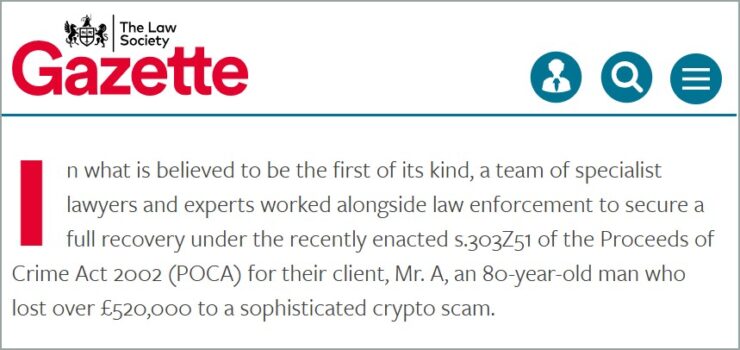UK police have successfully recovered approximately $671,000 (£520,000) in stolen cryptocurrency, marking one of the first major applications of the amended Proceeds of Crime Act 2002 to reclaim digital assets lost to fraud. The case involved an 80-year-old victim—identified in legal filings only as Mr. A—who was duped into transferring over 9.1 BTC to scammers posing as crypto exchange operators.
The fraudsters quickly converted the stolen Bitcoin into USDT (Tether) and transferred it to an offshore exchange in an attempt to evade detection. However, coordinated efforts between UK law enforcement, legal firms Edmonds Marshall McMahon and 5SAH, and professional services firm Grant Thornton enabled investigators to trace the assets and secure a freezing order under the updated legal framework.

The crypto recovery was made possible by changes introduced in October 2023, which expanded the Proceeds of Crime Act to cover digital assets. For the first time, victims of crypto-related fraud can now apply through the courts to recover funds from frozen wallets without the need for lengthy criminal trials or contested proceedings.
Legal Experts Hail Case as Turning Point for Digital Asset Recovery
According to Ashley Fairbrother, a partner at Edmonds Marshall McMahon, the success of the case reflects a pivotal shift in how UK law can be used to address the realities of modern financial crime.
“This legislation is a significant step forward—an innovative legal framework that streamlines the asset recovery process, provided there is constructive cooperation between the Police and victims,” Fairbrother said.
At the heart of the case was Section 303Z51 of the amended Proceeds of Crime Act, which gives courts the authority to issue freezing orders against crypto wallets believed to hold criminal proceeds. Once such an order is granted, victims may petition for the civil recovery of those funds—an option that was largely unavailable before the legislative updates.
The recovery was handled through criminal court proceedings, despite operating under civil law, highlighting the need for specialist legal expertise and careful procedural compliance. According to the HM Courts & Tribunals Service, more than £6 million ($7.7 million) in stolen crypto has now been recovered under the revised law—an early indication of the legislation’s impact.

Implications for Crypto Enforcement and International Regulation
The case is widely viewed as a precedent-setting moment in the evolution of crypto enforcement in the UK. Legal and law enforcement professionals say it demonstrates how traditional financial crime laws can be successfully adapted to tackle emerging threats in the digital economy.
The ruling may also serve as a template for international regulators, many of whom are grappling with similar challenges posed by decentralized and pseudonymous financial systems. The UK’s proactive legal update signals a growing recognition among global authorities that crypto assets require purpose-built enforcement tools, but can still be addressed through existing civil and criminal frameworks when properly adapted.
Quick Facts
- UK police recovered $671,000 in stolen crypto from an elderly victim using the Proceeds of Crime Act 2002.
- The fraud involved 9.1 BTC, later converted to USDT and sent offshore before being frozen and returned.
- New provisions added to the law in October 2023 allow courts to freeze and repatriate crypto tied to criminal proceeds.
- Legal experts say the case sets a key precedent for civil asset recovery through criminal courts in crypto-related fraud cases.





